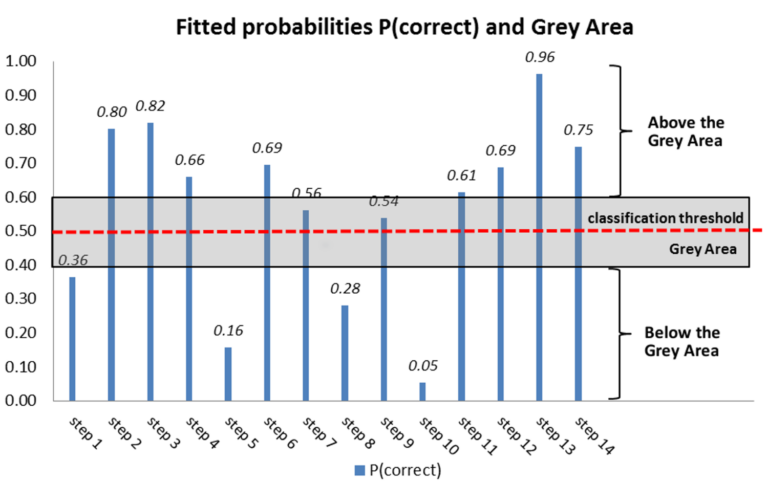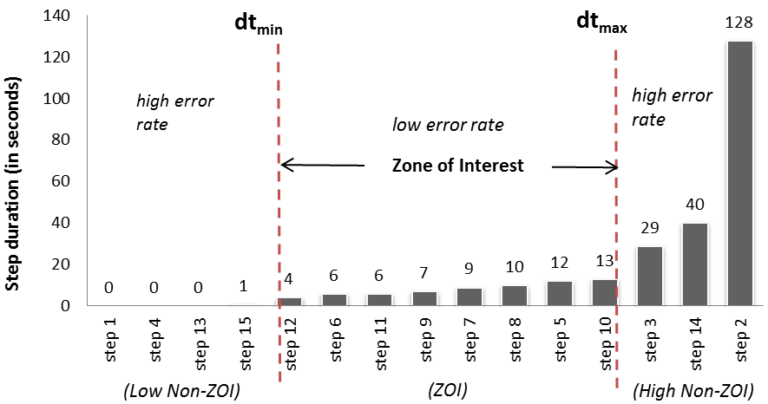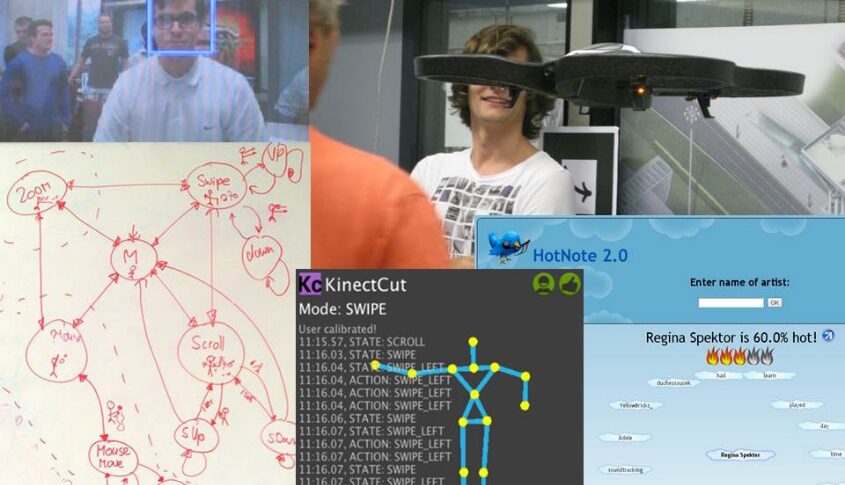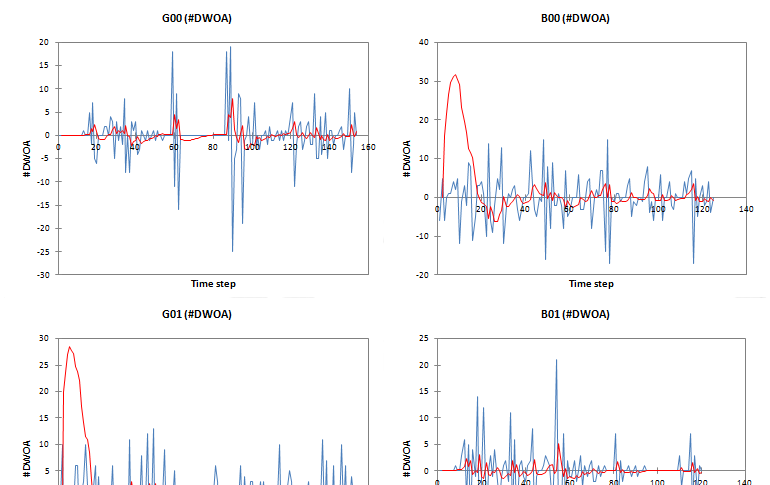Interests and Contributions
My research focuses on studying and modeling user interactions in various learning contexts. To that end, I follow a combined bottom-up and top-down approach: I engage in exploring data traces of user practice and in seeking patterns that may be backed up by theoretical reasoning. Following this approach, my main contributions are in student modeling and in learning analytics.
Personalized and adaptive feedback
To choose the appropriate level of scaffolding and to provide personalized feedback with respect to student’s needs, I follow the Vygotskian concept of the Zone of Proximal Development (ZPD). To that end, I have proposed the “Grey Area” approach that acts as a proxy for modeling the ZPD of individual students using learning analytics. According to this approach, the Grey Area is the area where the student model cannot predict with acceptable accuracy the outcome of a student step with respect to correctness and this can provide indication with respect to whether the student is (or is not) in the ZPD. The core rational is: if the student model cannot predict whether the student is able to carry out a learning task successfully, then it may be that the student is in their Zone of Proximal Development!

Response time and performance
This work builds on the hypothesis that there is no linear relationship between step duration and correctness. A student needs a minimum amount of time in order to process the problem, retrieve information, and construct a correct response. Otherwise, taking too long to carry out a step could indicate lack of background knowledge, failure to retrieve information, and inability to address the step. Therefore, there is a time frame defined by a minimum and a maximum step duration (dtmin and dtmax respectively) in which a student will likely provide the correct answer. Every step that lies outside this time frame will most likely be solved incorrectly or not solved. We identify this time frame as the Zone of Interest (ZOI) and we envision that this concept can be used to provide timely feedback to students and to improve the performance of computational student models.

Reinventing Project-based Learning
Existing “maker” or “hack” scenarios mainly take place in informal settings and aim at extracurricular activities. However, the maker culture is not only about the actual product. It is also about the process of creating an artefact in a social arena. The final product of a challenge reflects and represents the overall experience of the maker: the knowledge one has to seek and to acquire, the impact of other people’s practice, the self-reflection and self-assessment over the final product, and lastly, the sharing of this expedition with the community. Such important competencies can be supported through modelling, abstraction and scaffold self-reflection in conjunction with the learners making their own choices in the use of productive tools, i.e. by adopting the maker culture into the classroom, and vice-versa. By taking learning out of the classroom and transforming such events as hackathons, devcamps and makerspaces into impromptu learning opportunities.

Time-series analysis for collaborative learning
During my phD research, I proposed the use of time-series to model collaborative learning activities. I demonstrated that the classication of collaborative sessions, with respect to their time series attributes, may be related to their qualitative aspects. In this sense, collaborative sessions that share similar time series, will also share similar qualitative properties. Additionally, I implemented an automatic rater of collaboration quality using Dynamic Time Warping and studied its use as part of a teacher dashboard. A subsequent study revealed that the use of the automatic rater by teachers depended on the size of the classroom. That is, teachers were reluctant to use the rater for small-size classrooms and perceived it as “extra-workload”. However this changed when the size of the classroom increased: teachers used the rater to receive indications about students’ group work and to support their decision-making process.

Funding and Grants
- augMENTOR: Augmented Intelligence for Pedagogically Sustained Training and Education. Horizon Research and Innovation Action (RIA), 3 years (2023, Jan – 2025, Dec). Overall budget: 2 779 937.50 EUR, 390.000 Euro for own institution.
- DigiReady+: Digital Readiness in European Higher Education Institutions: a Data-driven Framework Guided by Institutional and Instructional Analytics (https://digiready.eu/), Erasmus + action type KA220-HED – Cooperation partnerships in higher education, 3 years (2022 Feb.-2025 Jan.). Overall Budget: 325.931 EUR, 74.070 EUR for own institution.
- Personal Research Funding (Estonian Research Council): Combining Machine-learning and Learning Analytics to provide personalized scaffolding for computer-supported learning activities, PSG286, Duration: 4 Years (2019 – 2022).
- Institute of Education: Development Fund Award (University of Tartu), 2020.
- Erasmus Placement Grant, University of Patras, 2013.
Service and Outreach
- July, 2023: Invited keynote talk, the 23rd IEEE International Conference on Advanced Learning Technologies (ICALT 2023). Talk title: “Computational methods for modeling and analysis of learning: Opportunities and Challenges for Artificial Intelligence in Education and Learning Analytics”
- February, 2022: Invited talk, Institut für Informatik, Julius-Maximilians-Universität Würzburg (JMU), Germany. Talk title: “Towards personalized, adaptive scaffolding for technology-enhanced learning contexts with the use of learning analytics.”
- October 2020: Invited talk, Bernoulli Institute, University of Groningen, the Netherlands. Talk title: “Towards computational systems of human cognition for guiding multifaceted, personalized learning.”
- July 2020: Invited talk, Deutsches Forschungszentrum für Künstliche Intelligenz (DFKI), Universität des Saarlandes, Germany. Talk title: “Using computational analytics to provide personalized, adaptive scaffolding in technology-enhanced learning contexts.”
- February 2020: Invited talk, Department of Computer Science and Applied Cognitive Science, University of Duisburg-Essen, Germany. Talk title: “From data traces to interventions: Computational Methods in Modeling and Analysis of Learning Processes”
- September 2019: Invited talk at the Learning and Educational Technologies Research Unit, University of Kyoto, Japan (Talk title: “Computational Learning Analytics for Personalized, Adaptive Feedback in Formal Education”)
- May 2019: Invited talk at the Institute for Business Informatics, Johannes Kepler University (Talk title: “Computational Learning Analytics to Provide Personalized, Adaptive Scaffolding”)
- April 2019: Invited talk at the Institute of Computer Science , University of Tartu (Talk title: “Using data analytics to provide personalized, adaptive feedback in educational contexts and beyond”).
- December 2018: Invited talk at the European Schoolnet, Learning Research Exchange subcommittee (Talk title: Use of Artificial Intelligence and Machine Learning in OERs and educational portals)
- August 2018: Invited talk at the IEEE Estonia Section Meeting at Jäneda, Estonia (talk title: ” LA Tartu: Designing a Learning Analytics platform for the University of Tartu… and beyond!”)
- October 2017: Invited talk at the ScienceEd meetings, University of Pittsburgh
- September 2017: Invited talk at the HCII Seminar Talks (video)
- April 2017: Two demos for the HCII Demo Day, Carnegie Mellon University
- November 2016: Invited talk at the PAWS Lab, University of Pittsburgh (slides)
- September 2016: Invited talk at the HCII Seminar Talks (slides, video)
- International Society of the Learning Sciences (ISLS): Communications committee member
- International Artificial Intelligence in Education Society (IAIED): Member
- Society for Learning Analytics Research (SoLAR): Member
- Association for Computing Machinery (ACM): Member
- Program Co-Chair for AIED 2024
- Conference Co-Chair for CSEDU 2024
- Program Co-Chair for CSEDU 2023
- Conference Co-Chair for Collabtech 2020
- Program Co-Chair for Collabtech 2019, ICALT 2021
- Publications Chair for AIED 2023, AIED 2022, AIED 2021, ECIS 2015
- Workshops and Tutorials Chair for ISLS 2022, ISLS 2021
- Organizing Committee for NordicLASI 2019
- Program Committee for several conference series (among others, LAK, CSCL, ECTEL, AIED, ICALT)
Associate Editor:
- Educational Technology & Society Journal (ET&S) (2023 – 2025)
Editorial boards:
- International Journal of Computer-Supported Collaborative Learning (IJCSCL)
Peer Reviewing:
- International Journals such as ijAIED, JLA, Computers & Education, Journal of Computer Assisted Learning
- International Conferences, such as LAK, ECTEL, CSCL, ICLS, AIED, ISLS, CSCW, CHI, Collabtech
- External Consultant for the Council of Europe for Artificial Intelligence and Education
- “Advanced programming in R” Workshop for the Female Code Lab (December 16, 2021)
- Twitter Takeover for Greek Girls Code (Nov. 16-21, 2021)
- Workshop for the Informatics Teachers’ In-Service Training 2021 offered by UDE.